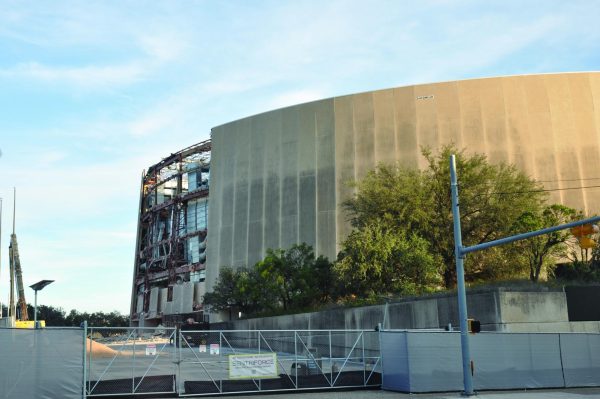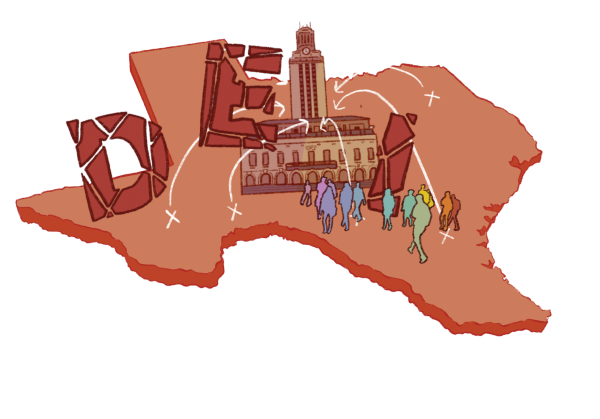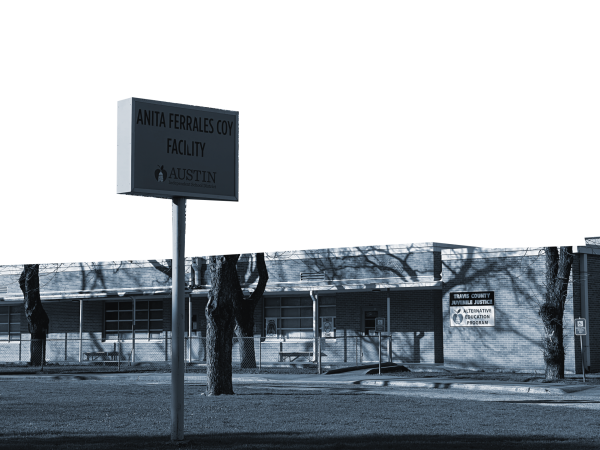Exchanging knowledge
Saudi Arabia’s Ministry of Education delegates visit school campus
February 19, 2019
Students waited in anticipation in the back of the library, bringing extra chairs and huddling with questions scribbled on small slips of papers in their hands. They all looked towards the entrance of the library for the grand entrance of Saudi Arabia’s Ministry of Education delegates.
The delegates traveled across the United States to learn more about American education. LASA was one of the few schools they visited. According to Principal Stacia Crescenzi, the president of the Texas International Education Consortium (TIEC) reached out to several schools and districts in the area to organize the visit.
LASA hosted five delegates from the Ministry of Education in Saudi Arabia. During the delegates’ time on campus, students were invited to participate in a discussion panel where the delegates answered student questions about Saudi Arabia’s education system. The delegates also listened to Crescenzi present about LASA’s specialized curriculum. Initially, she intended to present about US public education in general, but later changed her focus to be LASA-specific.
“Since we’re probably the only specialized school that they went to, I really focused more on what we do at LASA that might be a little different than a traditional school,” Crescenzi said. “So I walked them through the application process and I walked them through the rubric, I walked them through how I hire teachers, I walked them through what freedoms teachers have in terms of curriculum and pedagogy and where teachers don’t have freedom in terms of curriculum and pedagogy.”
Crescenzi said she wanted her presentation to help clarify the distinction between a traditional and a specialized school.She emphasized how LASA students have an overarching freedom in their decision-making after graduation. Throughout her presentation, delegates asked questions about the balance of technology with curriculum, according to Crescenzi. One of the noticeable differences between the two countries’ education systems is that Saudi Arabia concentrates more on what careers the current marketplace demands.
“It sounds like for the most part they were really struggling [with] ‘why don’t you help students,’” Crescenzi said. “They felt that was us kind of being unhelpful, in terms of ensuring you put your secondary education to the best use to be the citizen that the country needs afterwards, in terms of entering the marketplace based on the marketplace.”
More differences between the nations were apparent during the discussion panel. Students asked about many aspects of Saudi Arabia’s education system, from women’s education to international exchange programs. Social studies teacher Kim Pettigrew noted that delegates responded to questions in a businesslike manner rather than delving into the topic.
“I’m not sure students who asked questions were happy with the responses from the panel, but I don’t know that you could’ve expected a different response, given they are representing their government,” Pettigrew said. “Anyone, in any job, you’re not always free to say what you think because you’re representing someone else. They were about on line with what I expected. I don’t know if they were on line with what students expected though.”
Senior Anastasia Barnett said she attended the panel because it sparked her curiosity. After attending, she said the panel helped expand her understanding of the country and gave her newfound respect for nations like Saudi Arabia. She was especially intrigued in how the Ministry of Education administers funds to public schools.
“I was very interested in getting to hear the perspectives on their education because it’s so different from my experience as a LASA student, as an American,” Barnett said. “I wanted to hear how our system differed or are similar, because I’m very interested in learning about the world. I think it’s important to know how other people do it, just to assume that we’re not always 100 percent right.”
Crescenzi hopes that students in the panel had an experience that could motivate them to study or work in Saudi Arabia and the Middle East. Barnett said this opportunity allowed students be more open to learning from differences and having conversations about those said differences.
“I think the students here are curious about the world and with chances to expose them to real life, as opposed to what we read in books or see online,” Barnett said. “To be a part of the conversations is important for LASA students because it means that their voices matter and they’re getting a taste of the real world. It’s important to not be afraid of that which is different from you and to be open to learning about it.”









